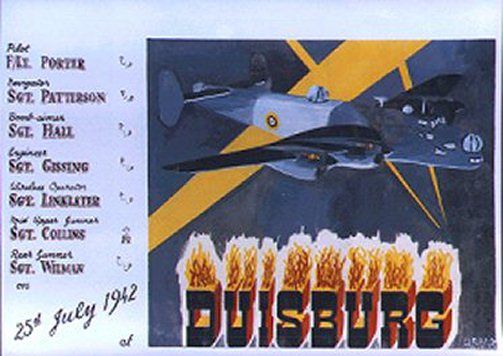 |
 |
My first posting was guard duty at an R.C.A.F. North Brandon Station.
After a week or so I was posted to Dauphin, Manitoba, along with seven other
chaps, for guard duty at an airdrome under construction. After a couple of weeks
the eight of us were posted, in error, to the (I.T.S.) Initial Training School
at Regina. An I.T.S. is a training school for pilots and we had been assigned to
train as (W.O.G.'s) Wireless Operator Air Gunners. We were kept in limbo at
Regina for about two weeks while everything was getting straightened out. It was
very pleasant in Regina. Here we were billeted at Regina College. It was spring
and we really enjoyed ourselves there.
We were then posted to #2 Wireless
School, Calgary. It was the Technical Training School (now SAlT). We were Flight
18Z and according to a group May, 1941 picture I still have, twelve out of our
twenty-seven strengths were Americans who had volunteered to fight with us. Most
of the twelve were ex-Marines or ex-Servicemen from the American Forces. A few
of them were alcoholics and I remember one chap in particular called Ault who
used to get the D.T.'s from drinking every payday. He would cry out at night
about snakes and devils and I forget what else. But I do remember it was a new
and unique experience for me to see and hear someone with the D.T.'s.
Our
Training consisted of learning the Morse Code and receiving the wireless
messages by the code. Also the operations and technical aspects of our
transmitting and receiving equipment. I recall the sets as being bulky and
cumbersome. We also had a couple of training flights in Tiger Moths, sending and
receiving messages while in flight.
We also had lots of calisthenics,
parade square marches, etc. I recall marching in the Calgary Stampede, where I
was a marker at the head of the column, and I remembered to keep my eyes
straight ahead when the "Eyes Right" command was given at the review
stand.
Being just out of school I had no problem with the course and I
enjoyed the excitement and experience of being in the service. Upon completion
of the course we were promoted to L.A.C.'s and received the Wireless Operator's
badge. Two of our original eight dropped out of air crew at this point. Bill
Fergie, whose father was a dentist in Cranbrook, and Vic Bellagente, whose
parents were Italians living in Medicine Hat. We were then posted to Bombing and
Gunnery schools for further training. There were two such schools on the
prairies, at Dafoe, Saskatchewan and at Mossbank, Saskatchewan. I was posted at
Mossbank. Our group of eight were split between the two stations. At Mossbank we
practiced operating 303 Browning machine guns, assembling and disassembling
them, etc. We had airplane recognition, map-reading, also types of bombs and
their purposes. We had flights in Fairey Battles when we shot at drogues (large
air socks towed behind accompanying planes). Our machine gun bullets were
colored so each trainee's score could be rated according to how many hits he had
on the drogue. We also had practice dropping bombs on dummy targets. All flight
training occurred over the alkaline Lake Johnson so there was no damage to any
property. While stationed here I had a chance to visit my sister Jane at Weyburn
where by brother-in-law Joe was a construction foreman building an aerodrome.
Our course lasted about a month. Upon completion we were awarded the W.A.G. wing
for Wireless Operator Air Gunner, and promoted to sergeant. I did well in my
course here and I would have received a commission but the few commissions
available were given to older fellows. I was among a select few chosen to report
to Dorval, Quebec, after our embarkation leave. We were chosen to receive some
additional training then to fly over to Britain with a lend/lease plane from the
USA, probably a Hudson for Coastal Command. A few days after I was in
Montreal/Dorval, the Japanese bombed Pearl Harbor and the Americans were in the
war against the Japanese and axis powers (Germany, Italy, etc.). There was
uncertainty as to whether or not the Americans would continue the lend/lease
program so I was sent to Halifax to go to Britain by boat. There was a critical
shortage of air crews so there was always an urgency to get us into action. This
stood me in good stead because when I got to Halifax I was reunited with my
pals; the Dunbars, Larsen, Dawdy and a few others who were still waiting for a
ship. We decided to take the ferry over to Dartmouth for a celebration. In due
course we ran afoul of something so the (SP's) Service Police were called to
take us back to our barracks. We got to fighting with them and I recall Ray
Herbert, who was an old fellow of twenty-eight, an exCanmore coal miner and used
to scrapping, punched one of the SP's and broke the fellows eardrum. We all
ended up in the guardhouse and we were held there a few days awaiting our fate.
Then because of the need for air crews we were told to get our kit bags. We
piled into the back of a truck and we were taken down to the loading docks.
Everyone else had to march down carrying their kit bags, so we felt we had the
last laugh.
 Previous Section |  Go Back to Chapter Headings |  Next Section |